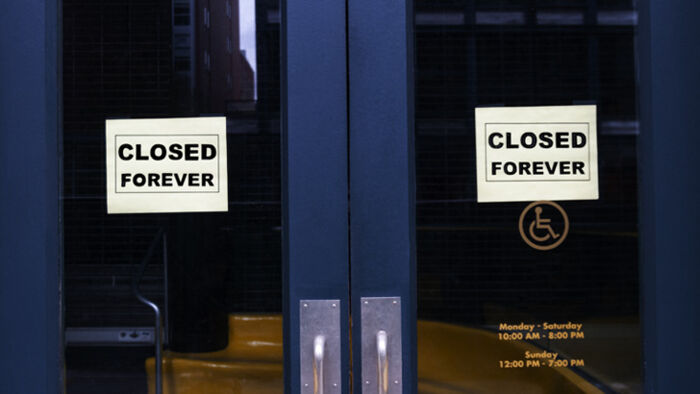What happens if your bank goes bust?
By Tom Watson
$1.28 trillion - it's a mammoth figure, but according to the latest statistics from the Australian Prudential Regulation Authority (APRA), that's the total value of household deposits which are currently stashed away in the country's authorised deposit-taking institutions (ADIs).
Breaking it down per capita, that means that every Australian (in theory) has $49,636 sitting in a combination of bank accounts, savings accounts, term deposits, offset accounts and other deposit accounts. Although, it's fair to say that even the thriftiest of toddlers is unlikely to have squirrelled that much money away.
Whichever way you look at it, Australians keep a lot of money inside banks. And that's not necessarily surprising given how fundamental banks accounts are to most people's day-to-day lives, or how useful savings accounts can be to helping people achieve their financial goals.
But a couple of recent bank closures have prompted the question: just how safe is our money? Here's a look at what would happen to your deposit or loan if your bank did shut.
Neobanks shut up shop
In December 2020, just over 12 months after being granted its banking licence, Sydney-based digital bank Xinja announced plans to close its doors and return funds to its customers because it ultimately couldn't raise enough capital as a result of the pandemic.
And just three months ago, fellow neobank Volt Bank followed suit, citing similar funding issues as the reason behind its decision to wind up.
In both cases APRA says that customers received their deposits back in full, with Xinja returning more than $252 million to around 37,000 customers and Volt handing back $107 million to around 5000 customers.
Having two banks close down in such quick succession is a quite rare event though, says Dr Paul Mazzola, a banking and finance lecturer in the faculty of business and law at the University of Wollongong. In fact, it hasn't happened in decades.
"The last time Australia had a bank that almost failed was the R&I Bank, now known as Bankwest, which experienced a bank run back in 1992. It was a failure, but it survived because the West Australian government stepped in and guaranteed all the deposits," Mazzola says.
"Just before that we had the failure of the State Bank of South Australia in 1991 and the failure of the State Bank of Victoria in 1990. Both banks incurred massive levels of bad debts, which they had to write off, and the losses that occurred as a result caused the banks to fail. So, they were both banks that failed, but in the end, were rescued by being sold to other banks.
"Of course, in the 1800s we had quite a number of bank failures - well over a dozen bank in fact. In saying that, Australia has had quite a benign history, because other Western countries have had a much more tumultuous history with their banking industry."
What are the safeguards in place for savings?
In the most recent examples of bank closures and failures, customers have had their money returned without issue. But what guarantee do customers have that their money would actually be returned?
Well, in 2008, the federal government set up the Financial Claims Scheme to protect people's savings, mortgage offsets and other deposits in the unlikely event that an institution went under.
"One of the reasons that is touted for Australian banks not failing in the wake of the Global Financial Crisis is the government's swift implementation of the guarantee plan for deposits held by banks and other ADIs," says Mazzola
"As we saw banks in America and the UK fail, people were getting nervous about keeping their money in the bank. That's why scheme was brought in, because the last thing the government wants is a bank failure denting confidence in our financial system and, in the worst case, causing a contagion effect and a run on all the banks."
Under the scheme, deposits of up to $250,000 per account holder, per institution are guaranteed. That's as long as the money is held by an authorised deposit-taking institution like a bank, credit union or building society.
While that threshold is likely to cover most people, those with a larger sum of money in the bank can still make sure that it's protected by splitting it over multiple institutions. For example, by keeping $250,000 in Bank A, $250,000 in Bank B and $75,000 in Bank C.
"If they're aware of it, wise people would probably spread their deposits around to make sure they keep under the $250,000 limit," says Mazzola. "Anything over and above $250,000 is at risk if the bank fails."
Would your mortgage be wiped?
Plenty of people with a mortgage, credit card or any other loan will probably have fantasised at some point about seeing their debt suddenly disappear in a puff of smoke.
Unfortunately, Mazzola explains, when a bank or lender goes bust, borrowers don't suddenly get a free pass on their loans.
"You're not off the hook. That loan is an asset of the bank, and it would just get sold to another lender or institution. So, you would just keep making the same loan repayments, but now to the new bank."
"It will be under the same terms and conditions that you had agreed to with the original lender, except there might be slightly different payment arrangements, such as paying into a different bank than the old one."
Should safety be a consideration when choosing a bank?
Because bank closures in Australia have been relatively rare and the government has introduced protection for savings and deposits with its Financial Claims Scheme, most Australians are unlikely to give too much thought to the issue of safety when picking someone to bank with.
But should they? Given how strongly they're regulated, Mazzola believes that safety doesn't need to be quite as much of a concern when choosing a bank, as long as it's a licensed ADI. However, he still recommends that people do their due diligence.
"We're fortunate that we have one of the most well regarded and regulated financial systems in the world. But as with anything, it's buyer beware. I would always say to anyone, if you have the resources and know-how, make sure you look into any institution that you're intending to put your money in."
"At the end of the day, there have been bank failures, it's just that we've managed to avoid any major losses for customers. But if you go to other countries, like Greece, you'll probably find that every second person has lost money because of the bank failures a number of years ago. So, we can't just say relax because you just never know."
Get stories like this in our newsletters.



